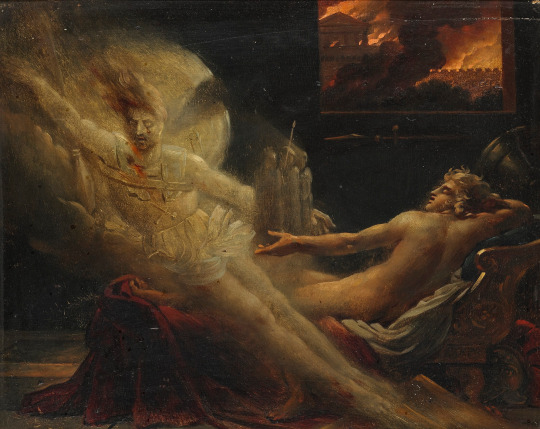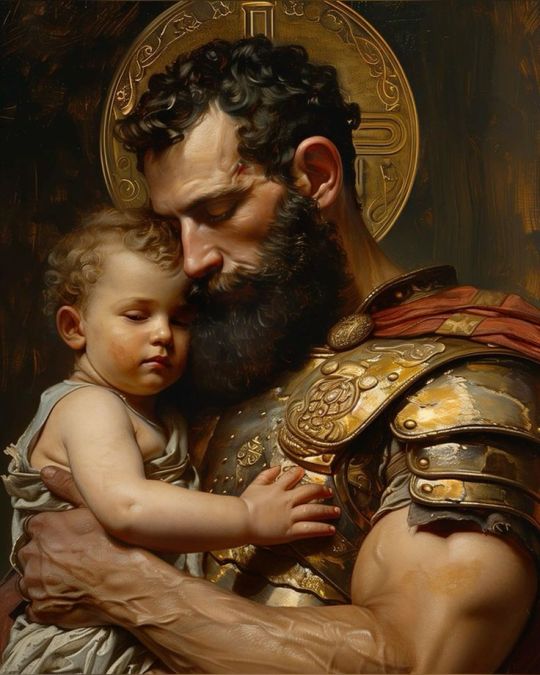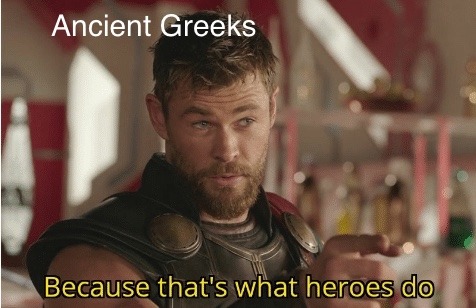#Sack of Troy
Explore tagged Tumblr posts
Text

#other plays that center Trojans after the war but still#the Trojan Women (1971) literally broke me#Andromache babygirl I’m sorry ppl keep excusing and watering down Odysseus’s actions#and that’s always why it’s fuck Astyanax lives aus where he is adopted by Odyseus#Athena and Hera aren’t off the hook either but at least Athena expressed some remorse and regret#greek mythology#ancient greek mythology#greek pantheon#Odysseus#Andromache#Trojan war#the trojan war#the trojan women#Troy#sack of Troy#astyanax
182 notes
·
View notes
Text

The Shadow of Hector Appears to Aeneas or The Dream of Aeneas
by Anne-Louis Girodet de Roucy-Trioson
#aeneas#hector#art#anne louis girodet de roucy trioson#virgil#virgil's aeneid#the aeneid#aeneid#sleep#sleeping#dream#trojan#trojans#troy#trojan war#mythology#roman mythology#classical antiquity#mystique#sack of troy#city#fire#europe#european#sacred relics#neoclassicism#neoclassical#romanticism#romantic
362 notes
·
View notes
Text

Hector and Astyanax.
#greek mythology#the iliad#homer#hector of troy#astyanax#a.i.#the trojan war#artificial intelligence#orlando furioso#a.i. art#Little Iliad#a.i. generated#Ἰλιὰς μικρά#trojan cycle#trojan war#Sack of Troy#Greek literature
9 notes
·
View notes
Text
this passage in quintus' posthomerica made me hold my breath as i read it. odysseus is a wolf and the carnage is about to begin.
[...I]n [Odysseus'] wisdom he stopped the general onrush and with nimble hands he quietly opened both the flanks of the wooden horse, guided by Epeios of the ashwood spear. Raising his head a little above the planks, he peered all round to see if any Trojan was awake. As when it feels the pangs of grievous hunger, a wolf comes down from the hills in urgent need of food straight for a spacious sheepfold, steering clear of men and dogs whose purpose is to guard the flock, and crosses the fence of the fold with feet unhindered; Like that Odysseus came down from the horse.
#i'm just continually fascinated by how the sacking of troy is at once meant to be horrific and triumphant#i guess that's war for you#odysseus#epeius#posthomerica
353 notes
·
View notes
Note
Could you draw Elpenor and Perimedes perhaps :3

Gossip girls
#you cannot tell me that these people did not gossip about some stupid stuff#hey did you hear ody threw a baby off of the walls of troy#nah bro quit playing no way he did that#yeah dude i swear where were u at when we were sacking troy#type stuff yk#epic the musical#greek mythology#the odyssey#homers odyssey#my art#my doodles#elpenor epic#perimedes epic#perenor#perimedes and elpenor#elpenor x perimedes
66 notes
·
View notes
Text
The Epic Saga: Just A Man
Trigger warning for infanticide.
I want to talk about what an interesting choice it was in Epic's first installment for Odysseus to be the one to kill the infant.
In all versions of the story, the fate of Astyanax, son of Prince Hector, is always the same. He is thrown from the walls of Troy while the city is sacked. What varies from telling to telling is who does the deed, and it's usually between two people: Odysseus and Neoptolemus.
Most modern retellings make Neoptolemus the villain in this story, or they'll leave out this part entirely, because in the eyes of today's society, the senseless murder of a helpless infant is something only a villain would do.
Who's Odysseus? He's the man who won the Trojan War by engineering the idea behind the Trojan Horse, he's the guy who took ten years to sail home, he's the main character of The Odyssey. Odysseus is a hero. And heroes don't kill infants.
Who's Neoptolemus? He's forgettable. He didn't go on any heroic quests like Herakles or Perseus. He didn't slay any noteworthy monsters. Neoptolemus' biggest claim to fame are three things: He's the son of Achilles, he clubs King Priam to death in the sacking of Troy, and in some versions, he kills Astyanax. (He also enslaved Astyanax's mother.)
From the lens of the Ancient Greeks, a hero wasn't an upstanding guy who did the right thing. A hero was the guy who fought for what he wanted and did horrible things to his enemy in the process.

In the context of modern society, it's no wonder why the dubious credit of Astyanax's death goes to Neoptolemus. When that's the only real claim to fame he has, of course he's going to be a villain. We can't be having heroes killing babies because that's insane.
So let me tell you that when I first listened to The Horse and The Infant and I realized it was Odysseus who was committing the deed, that took me so off guard and I had to pause the song just to tell my poor sister how fucking crazy that is. I rarely saw this version. I mean, I understand the reasoning; it's setting up Odysseus' guilty conscious that'll plague him for the remainder of the musical. It's the flawed hero trope, which is a far cry from the brutality of the original myths.
And that in itself is testament of how mythologies have evolved over the centuries. It's why we have different variations of the myth in the first place. Societal views and values change and the stories told adapt accordingly.
Did Hades kidnap Persephone or did she go willingly to escape Demeter, her overbearing mother? Both versions are correct. All versions are correct. We cannot look for something as narrow-minded as a 'canon' version of mythology because mythology is a jumble of headcanons about the same basic concept thrown together by countless storytellers over literal centuries of storytelling.
In The Horse and The Infant, Zeus directly warns Odysseus that if Astyanax lives, he will take vengeance on him and his homeland. And after what the Greeks did to Troy, slaying the men, enslaving the women, and leaving the city in ruins, Odysseus is one of many Greek kings who have a lot to answer for.
Is Odysseus heroic for protecting his family by killing Astyanax because now the infant prince won't grow up to take vengeance?
Is Odysseus a flawed hero who carries the shame of his sins with him?
Is the deed committed by Neoptolemus and Odysseus goes home with his honor unsullied?
It all depends on interpretation. You can choose one that reflects a harsh history or you can pick the one that's been adapted to suit modern values. You don't even have to pick. You can appreciate them all for what they are.
And Epic: The Musical came out swinging.
#epic the musical#odysseus#the odyssey#the iliad#the horse and the infant#neoptolemus#astyanax#the sack of troy#greek mythology#myth retelling#mythology evolution
159 notes
·
View notes
Text
I think a lot about the depictions of Troilus' death that feature Achilles trying to prise him with a gift of doves instead of the immediate promise of death.
I've alluded to it before, but I tend to look at Achilles and Apollo as comparison cases - maybe not explicitly foils because I'm petty and that would imply that Achilles is narratively equal to Apollo and I don't want to give him that kind of honour even in a bit of casual analysis - but certainly as characters who gain a great deal of complexity when their actions are contextualised in context of each other's. The ambush of Troilus is just one of those funny little things that gets my mind a-whirring.
Because to me, Apollo's 'Troilus' so to speak is Kassandra. Kassandra, who Apollo coveted and wished to court. Kassandra, who was offered a great gift that would have undoubtedly forever marked her as one of Apollo's if she had accepted. Kassandra, who takes the gift but rejects the god and is cursed for her deception. Kassandra, whose curse makes her experience a thousand deaths over and over with no way of communicating such disaster to those around her.
The Achilles who falls in love with Troilus upon seeing his beauty and wishes to make a conquest of him is much the same to me. The biggest difference between Troilus and Kassandra though is that Troilus' rejection is much more physical. Those doves are nothing more than a symbol of the type of sacrifice Troilus would be; if he accepted them, he would die a docile death, sweet and quiet, a necessary casualty to turn the winds like Iphigenia. Except Achilles' love is nothing like Agamemnon's and it is nothing like Apollo's.
In the face of rejection, Achilles' instinct is to maim, it is to destroy. He was always going to kill Troilus - for the sake of the campaign, the boy had to die - but there was no dove's death, no quick and easy knife through the heart, no spit into an open mouth. Troilus' death is a brutal, drawn-out thing, a chase through the sand, a dragging that bruises his skin, a ripping of his hair, a violation of his flesh, a maiming of his corpse. As far as sacrifices go, it's an apalling one. None would dare to treat an animal set to be sacrificed before a god with that kind of brutality, sacrifices were meant to be blemishless and beautiful, something the gods would find appealing. Iphigenia was given away in her wedding finery, Kassandra was dressed as though to seduce a god. Troilus was a dove with his wings broken and his feathers pulled, whose death cries must've been like the terrible hollering of all birds when they try to alert their kind to a predator.
And as fucked as that is, I love it. It sets Achilles' love as this stormy, squallish thing that bleeds into his rage, it establishes that for him, love and wrath are but two sides of the same blade. Troilus was a necessary sacrifice, but he is in no way given even a modicum of the same dignity his contemporaries are and a part of me is just continually intrigued by this.
#greek mythology#ginger chats about greek myths#I didn't intend to bring Iphigenia into this but she's also handshake emoji with Kassandra and Troilus so here she is#It's super interesting - I consider Troilus and Kassandra as heralds of different turning points in the war#Troilus' death marks the end of that nebulous phase where the Achaeans' actions are ultimately meaningless because they cannot defeat#divine providence with their mortal attempts#and Kassandra's assault is when the last of the gods abandon Troy (the place) for its sack#I've also always found it super fun that Apollo was stopped from intervening with the Troilus assault but Athena#willfully turns her gaze away so she doesn't have to watch Kassandra's defilement on her altar#The different features at play connecting Troilus and Kassandra (and Iphigenia) have always fascinated me oh my gosh#Also the different flavours of love on display at each of the sacrifices#Apollo's Achilles' and Agamemnon's desires are all extremely different but the objects of their affection ends up the same#The savage twist that follows the rejection of those desires is also super interesting when compared#anyway that's a ramble for a different day lmao#the iliad#achilles#apollo#troilus#kassandra#iphigenia
105 notes
·
View notes
Text
Odysseus of Ithaca during the Sacking of Troy
#but sir#the gods told me to do it#they wanted me to yeet that baby#so i did#i’m just a little guy#just a man#the iliad#the odyssey#odysseus#epic the musical#epic the troy saga#troy#trojan war#sacking of troy#classics#homer
61 notes
·
View notes
Text
I finished reading The Illiad. What am I supposed to do, pick up another book?
#i think the most frustrating part is that i'd LOVE to read what the other authors had to say about the trojan war#y'know like actually reading what paris said to menelaus before pulling a bowser on him#or reading about the sacking of the cities near troy by the greeks i wanna hear more about briseis that poor woman#fuck you mean achilles killed your whole damn family and held you captive and yet you still consider his right hand man a friend#and then its either all lost media or no one ever bothered to write about what im actually interested in#the illiad#tagamemnon
15 notes
·
View notes
Text
achilles' native phthia getting taken over by a priamides is so beautiful to me
6 notes
·
View notes
Text
Imma need Neoptolemus fans to stop whitewashing and excusing his actions I’m so serious.
#using a baby to club an old man to death then raping that baby’s mom is pure evil no matter how you spin it#and him being young and brainwashed makes it worse actually#‘it’s a war they all did war crimes’ I agree and that’s why they’re all bastards#the reason him killing Astyanax and Priam like that is such a popular subject in paintings is bc of how shocking and cruel it was#the ancient Greeks did not think that shit shit was normal or ok#no matter how much they loved war there’s a limit#greek mythology#ancient greek mythology#greek pantheon#neoptolemus#Pyrrhus#Trojan war#sack of Troy#Andromache#astyanax#Priam
77 notes
·
View notes
Text

"I keep thinking of the infant from that night,
I keep thinking of the infant from that night,
I keep thinking of the infant from that night..."
the hyperfixation so powerful ya can't sleep some days (;_;)
#EPIC the musical#the odyssey#astyanax#son of hector#y’know… that one baby that was flung from the walls of Troy#killed by Odysseus#or maybe#neoptolemus#depending on who you ask#tagamemnon#trojan war#probably a lot of other babies were killed that day (the sacking of cities be like that) BUT THIS BABY HAD A NAME#:(#the iliad#epic the troy saga#odyssey fanart#jay rivera herrans#lyric quotes#my art#fanart#art wip
53 notes
·
View notes
Note
I’ve watched Troy : Fall of a city! It’s uh… well it’s something.
But that scene, that scene was so gay and so tasty and just hnnngh. Like, there was absolutely no need for Menelaos to hug Paris that close and for that long. It’s not like he had to trick Paris to stab him or anything, he could have just, poked him with the sword. And yet, and yet
God but Menelaos fucking Paris on his and Helen’s bed while Troy is burning is just, hngh. Even better if Helen is there to see it.
It... is, yep. (': I could only stand to watch the first one and a half episodes and then I gave up, but I'd seen a bit of Paris' death scene as part of a music video for Troy:FoaC, which was why I wanted to see it at all. So after I gave up on the rest I took my ass to the last episode to find that scene lol
And I was sure rewarded beautifully!
Because exactly!! Paris' death scene is DELIGHTFUL lol. There really is NO NEED for any of the choices made there, but I treasure each and every one.
The hugging, for one. Just. The HUGGING, wtf. And then Menelaos keeps standing there - sure, it's to keep giving these tiny little stabs of the sword (erm, which should be vicious and it rather is but it isn't JUST that when Menelaos is standing there embracing Paris to himself!) but he wouldn't need to hold him that close to do so! Then the push onto the bed... truly The Most.
Yessss. The whole. Fucking the man who has been fucking your wife on the bed said man and your wife have been fucking on... yes go on, nothing weird with that! Menelaos angrily ordering Paris up on the bed and just. going to town. While Helen watches... hehe.
#asks#for troy and sparta#still cannot BELIEVE there are two scenes with similar themes and yet so different and they are PERFECT#this is the ONLY way I accept Paris living to the sack
4 notes
·
View notes
Text
Troy (2004) is barely even recognizable as a retelling of the iliad. What was happening in 2004. This movie had literally nothing in common with the poem besides the names.
#they killed my boy menelaus#the let paris live#neos not even in it#agamemnon grts killed by briseis#patroclus is achilles cousin?#achilles dies in the sacking of troy?#the gods arent real?#achilles is an athiest?#i could keep going#troy 2004 negative
5 notes
·
View notes
Text
The idea that Helen chose Menelaus first comes from Euripides’ play Iphigenia in Aulis — which also explicitly states Helen went willingly with Paris. In the Catalogue of Women, it is highly unlikely Helen got to choose a husband herself given that it says Menelaus won because he was the wealthiest and continuously communicated with Castor and Polydeuces. If you're wondering why Euripides would make something like this up, it's because Athens and Sparta were at war. He probably wanted to highlight how apparently “untrustworthy” and “deceptive” the Spartans were.
AGAMEMNON: Now when they had once pledged their word and old Tyndareus with no small cleverness had beguiled them by his shrewd device, he allowed his daughter to choose from among her suitors the one towards whom the sweet breezes of Aphrodite might carry her. [70] Her choice fell on Menelaus; would she had never taken him! Then there came to Lacedaemon from the Phrygians the man who, Argive legend says, judged the goddesses' dispute; in robes of gorgeous hue, ablaze with gold, in true barbaric pomp; [75] and he, finding Menelaus gone from home, carried Helen off, in mutual desire, to his steading on Ida.
Look at the language: Tyndareus beguiled them. Euripides does not view these Spartans in a very kind light. Tyndareus is deceptive for making all the Achaeans swear the oath and giving the choice to his daughter. Helen is deceptive for getting to choose her husband yet still running off with another. See, Paris carries her off in mutual desire. If you doubt this because it is Agamemnon speaking, the chorus will later go on to confirm the fact.
CHORUS: And from Mycenae, the Cyclopes' town, Atreus' son sent a hundred well-manned galleys, and Adrastos was with him in command, as friend with friend, [270] that Hellas might exact vengeance on the one who had fled her home to wed a foreigner.
Here are the extracts from the Catalogues of Women:
And from Ithaca the sacred might of Odysseus, Laertes son, who knew many-fashioned wiles, sought her to wife. He never sent gifts for the sake of the neat-ankled maid, for he knew in his heart that golden-haired Menelaus would win, since he was greatest of the Achaeans in possessions and was ever sending messages to horse-taming Castor and prize-winning Polydeuces.
See also:
But warlike Menelaus, the son of Atreus, prevailed against them all together, because he gave the greatest gifts.
And here are other sources confirming the idea that Helen was not kidnapped:
The Iliad, book 3, Helen speaking to Priam. Remember this is after almost 10 years of this bloodshed, which Helen clearly blames herself and Paris for. She implies that what had pleased her the day she went with Paris was Paris himself.
Would that evil death had been my pleasure when I followed thy son hither, and left my bridal chamber and my kinfolk and my daughter, well-beloved, and the lovely companions of my girlhood.
The Cypria, lost epic detailing the beginnings of the war, Proclus’ summary. There is no language of force, and it is clear Helen and Paris are acting together.
Aphrodite brings Helen and [Paris] together. After their intercourse, they load up a great many valuables and sail away by night.
Pseudo-Apollodorus' Bibliotheca epitome.
[Paris] persuaded Helen to go off with him. And she abandoned Hermione, then nine years old, and putting most of the property on board, she set sail with him by night.
The driving idea of Sappho 16 is Paris being what Helen desires most.
Even texts that call it an abduction make it clear Helen was in love with Paris. Take Herodotus' Histories, where he quite literally says Paris "gave wings to [Helen]" — other translations render it as him "stirring her to desire."
Hot take about the Trojan war:
So people give Menelaus flack for starting a war over Helen, saying he saw her like property. Listen if I got kidnapped by a whiny bitch baby who “won” me off a divine bet and my spouse went “dude give my wife back or I’ll rock your shit” and Paris went “lmao no you fuckin loser finders keepers” I WOULD WANT MY HUSBAND TO ROCK HIS SHIT. (Also Helen was literally crown Princess of Sparta and the most beautiful woman in the world and she chose to marry Agamemnon’s little brother who inherits nothing...they’re in love okay? Okay.)
#lads i love menelaus and it's obvious the war was inevitable (it was the will of zeus) but can we look at the sources before making claims#helen obviously loves menelaus as seen in the odyssey but that does not mean she didn’t also love paris- at least at first#there is ten years between her leaving and where we find her in the Iliad then another ten years to the odyssey#the people of troy (barring priam and hector) blame her for the war- she blames herself for the war- obviously things would change#and in the sack of troy many depictions have menelaus about to kill/harm helen before aphrodite/helen’s beauty intervenes#cait cares way too much about mythology takes tag
671 notes
·
View notes
Text
In the horse straight up "sacking it" and by "it". Haha, well . Lets jusr say. The holy citadel of troy
3K notes
·
View notes